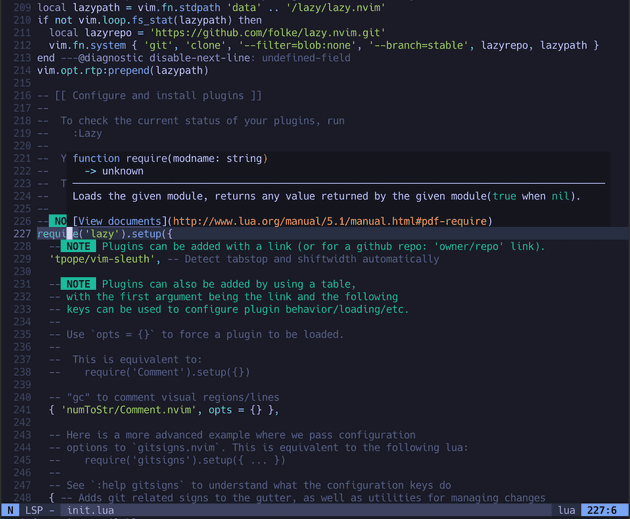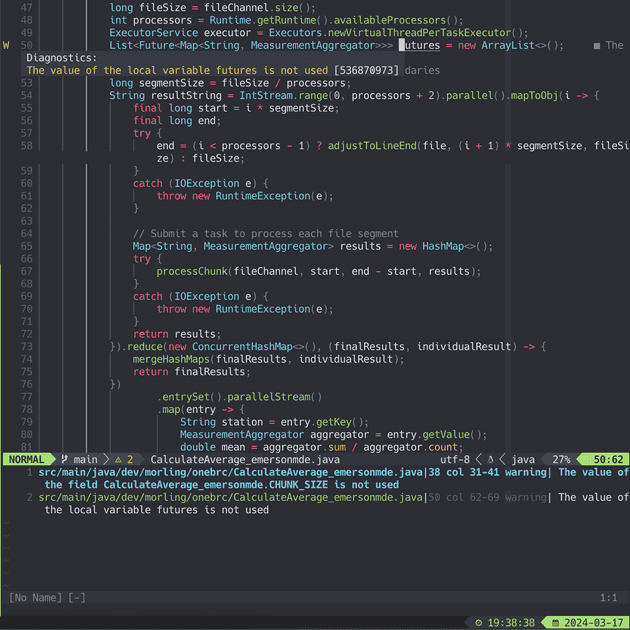Over the past 5 years I've been hooked on JetBrains IDEs. It really started with using IntelliJ for Java at work. I was impressed with the number of useful tools and features that came with IntelliJ from refactoring code, to code completions including dependencies, to an excellent built in debugger and so much more. All of these made me far more efficent writing Java with IntelliJ than I was in other languages. At the time I was a a devout Vim acolyite and spent many late nights trying to find the optimal setup. As it turns out IntelliJ's default settings covered almost everything I wanted. In comparison my Vim setup was lacking many of the features I came to rely on which would take significant effort to replicate with far less polish in Vim. It wasn't long before I was paying for the JetBrains All Products bundle for side projects as well.
While IdeaVim was good enough to provide familiar Vim motions and some basic features there were ocasionally more complex commands that I wanted to use that I found were missing. I also didn't get into fully configuring IdeaVim, relying more on the IntelliJ configuration options. Beyond IdeaVim, there were other downsides that are obvious from the start but were secondary to the functionality offered. The intense indexing process often made the IDE unusable at times and lead to very slow start up times. There are few programs that devour RAM faster than Chrome, but IntelliJ often wins out. Also JetBrains releases specific versions of Idea with integrations and tools for specific languages such as PyCharm for Python or RubyMine for Ruby but that often results in managing multiple applications and switching between them or accepting some tradeoffs by using language specific plugins in IntelliJ.
Back To The Future
I saw coworkers, streamers, and YouTubers using NeoVim and noticed these new setups looked far better than what was available when I was daily driving Vim. Many also showcased features like code actions that I thought were unique to IntelliJ and other similar full featured IDEs. After some investigation, setups like these were pretty common and to my surprise they didn't take thousands of lines of custom VimScript or a host of plugins. Many of these context aware features came from the usage of language servers. These language servers implment the Language Server Protocol, a standard protocol originally developed by Microsoft and used in VSCode to allow language maintainers and communities to build code aware capabilities agosnotic of the editor.
Although I knew these setups existed and there were great video walkthroughs available, I knew this could be a significant time sink. To avoid the enividible start up cost I turned to a NeoVim distrobution, LunarVim. This distro looks great and comes with batteries included designed as a fully working IDE. As good as this sounded at first, I quickly ran into issues I had with the provided defaults and found myself diving into the config anyway. The downside was now I had to learn the LunarVim abstractions on top of the underlying plugins and NeoVim config. I ended up abandonding the exparimient and returning to the world of JetBrains.
NeoVim Kickstart
After a few more months had past, I came across NeoVim Kickstart, a small well documented starting config that includes completions, LSP servers, and looks great out of the box. There was also a great video by TJ DeVries, the creator of NeoVim Kickstart and a NeoVim core maintainer, that explains in detail what each line does and how to further customize it.
This was a great way to get into NeoVim. Its written all in Lua, not my preference but signficiantly better than bespoke VimScript, and since it is well documented it was easy to add on to or change as needed. I found it struck the perfect balance between predefined functionality and customizability.
Kickstart comes configured with Mason, a plugin that manages external tooling such as LSP servers, linters, and formatters. Most of these work just out of the box with minimal config. Java on the other hand, took a lot of trial and error.
Lombok
Mason can automatically install and configure the Eclipse JDT Language Server which works well enough but did not automatically recognize Lombok annotations. This seemed odd because it has a Lombok setting which defaults to true. Some posts online suggested including the Lombok JAR and specifying it in the Java falgs in the JDT-LS settings. Sounds easy enough.
I spent the next few hours learning Lua and creating an initialization function that would automatically install JDT-LS and the Lombok JAR then configure the LSP outside of Mason. In the end I realized this would be painful to maintain in the future. Some of the links had to be hard coded, some required special handlers to verify checksums, and all of the steps required seemed fragile.
This Is The Way
I decided to start over, leaning on Mason to download and maintain the JDT
language server and the Lombok JAR but instead of using Mason-LspConfig I would
use mfussenegger/nvim-jdtls
to configure JDT-LS.
First I added jdtls to the servers table so Mason
would automatically download everything needed, then added a skip_setup key
to avoid configuring it with lspconfig:
mason_lspconfig.setup_handlers {
function(server_name)
if servers[server_name] ~= nil and servers[server_name].skip_setup then
return
end
require('lspconfig')[server_name].setup {
capabilities = capabilities,
on_attach = on_attach,
settings = servers[server_name],
filetypes = (servers[server_name] or {}).filetypes,
}
end,
}Then added a function to configure jdtls with nvim-jdtls:
local function jdtlsConfig()
local os_name = vim.loop.os_uname().sysname
local arch = vim.loop.os_uname().machine
local config_dir_name = 'config_linux'
if os_name == 'Darwin' then
config_dir_name = arch == 'x86_64' and 'config_mac' or 'config_mac_arm'
elseif os_name == 'Linux' then
config_dir_name = arch == 'x86_64' and 'config_linux' or 'config_linux_arm'
end
local jdtls_dir = home .. '/.local/share/nvim/mason/packages/jdtls'
local config_path = jdtls_dir .. "/" .. config_dir_name
local project_name = vim.fn.fnamemodify(vim.fn.getcwd(), ":p:h:t")
local workspace_dir = jdtls_dir .. '/workspace/' .. project_name
local function on_init(client)
if client.config.settings then
client.notify("workspace/didChangeConfiguration", { settings = client.config.settings })
end
end
local bundles = {}
local extendedClientCapabilities = require("jdtls").extendedClientCapabilities
extendedClientCapabilities.resolveAdditionalTextEditsSupport = true
return {
cmd = {
'java', -- or '/path/to/java11_or_newer/bin/java'
'-Declipse.application=org.eclipse.jdt.ls.core.id1',
'-Dosgi.bundles.defaultStartLevel=4',
'-Declipse.product=org.eclipse.jdt.ls.core.product',
'-Dlog.protocol=true',
'-Dlog.level=ALL',
'-javaagent:' .. jdtls_dir .. '/lombok.jar',
'-Xms1g',
'--add-modules=ALL-SYSTEM',
'--add-opens',
'java.base/java.util=ALL-UNNAMED',
'--add-opens',
'java.base/java.lang=ALL-UNNAMED',
'-jar',
vim.fn.glob(jdtls_dir .. '/plugins/org.eclipse.equinox.launcher_*.jar'),
'-configuration',
config_path,
'-data',
workspace_dir,
},
flags = {
debounce_text_changes = 150,
allow_incremental_sync = true,
},
handlers = {},
root_dir = require('jdtls.setup').find_root({ 'build.gradle', 'pom.xml', '.git' }),
capabilities = require('cmp_nvim_lsp').default_capabilities(vim.lsp.protocol.make_client_capabilities()),
on_init = on_init,
on_attach = on_attach,
init_options = {
bundles = bundles,
extendedClientCapabilities = extendedClientCapabilities,
},
settings = {
java = {
signatureHelp = { enabled = true },
configuration = {
updateBuildConfiguration = 'interactive',
},
eclipse = {
downloadSources = true,
},
maven = {
downloadSources = true,
},
implementationsCodeLens = {
enabled = true,
},
referencesCodeLens = {
enabled = true,
},
references = {
includeDecompiledSources = true,
},
inlayHints = {
parameterNames = {
enabled = 'all',
},
},
completion = {
favoriteStaticMembers = {
'org.hamcrest.MatcherAssert.assertThat',
'org.hamcrest.Matchers.*',
'org.hamcrest.CoreMatchers.*',
'org.junit.jupiter.api.Assertions.*',
'java.util.Objects.requireNonNull',
'java.util.Objects.requireNonNullElse',
'org.mockito.Mockito.*',
},
},
sources = {
organizeImports = {
starThreshold = 9999,
staticStarThreshold = 9999,
},
},
codeGeneration = {
toString = {
template = '${object.className}{${member.name()}=${member.value}, ${otherMembers}}',
},
useBlocks = true,
},
},
},
}
endFinally, I just had to call this function when editing Java files:
vim.api.nvim_create_autocmd("FileType", {
pattern = "java",
callback = function()
require("jdtls.setup").add_commands()
require("jdtls").start_or_attach(jdtlsConfig())
end,
})Whats Left?
Java was the only real gap to fill. Besides Java, I added vim-tmux-navigator:
require('lazy').setup({
-- ...
{
"christoomey/vim-tmux-navigator",
cmd = {
"TmuxNavigateLeft",
"TmuxNavigateDown",
"TmuxNavigateUp",
"TmuxNavigateRight",
"TmuxNavigatePrevious",
},
keys = {
{ "<c-h>", "<cmd><C-U>TmuxNavigateLeft<cr>" },
{ "<c-j>", "<cmd><C-U>TmuxNavigateDown<cr>" },
{ "<c-k>", "<cmd><C-U>TmuxNavigateUp<cr>" },
{ "<c-l>", "<cmd><C-U>TmuxNavigateRight<cr>" },
{ "<c-\\>", "<cmd><C-U>TmuxNavigatePrevious<cr>" },
},
},
})And some colorscheme updates:
require('lazy').setup({
-- ...
{
"sainnhe/sonokai",
config = function()
vim.g.sonokai_style = "default"
vim.g.sonokai_disable_italic_comment = true
vim.g.sonokai_menu_selection_background = "green"
vim.opt.termguicolors = true
vim.cmd.colorscheme("sonokai")
end
},
})
local custom_auto = require('lualine.themes.auto')
custom_auto.normal.a.bg = '#a7df78'
custom_auto.insert.a.bg = '#85d3f2'
require('lualine').setup {
options = { theme = custom_auto },
}With these few changes, NeoVim has quickly become my go to IDE. It's snappy, functional, easy to add on to, and it looks great. I think I may have found the long awaited IntelliJ killer, it just happened to be lurking in the background all along.

